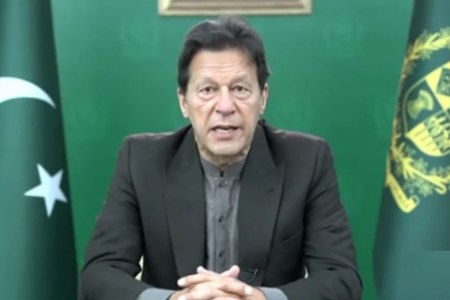Prime Minister (PM) Imran Khan Monday called for disavowing power rivalries and geopolitical competition and said the world was at a critical point in world history, to help developing nations cope with the negative economic impact of the Covid-19 pandemic.
“We must opt for unconditional international cooperation. Together, we can – we must – construct a new, peaceful, equitable and sustainable world order,” he said in his opening statement at the special segment of the United Nations (UN) Economic and Social Council (ECOSOC) forum on Financing for Development.
The prime minister highlighted the need to mobilise funds “needed by developing countries to recover from the Covid-induced recession and restore them on the path to achieving the Sustainable Development Goals by 2030”.
“An enormous push at the highest political level is needed to reverse dangerous trends, prevent successive waves of infection, avoid a lengthy global recession and get back on track to fulfil the 2030 agenda,” the UN chief added.
The premier said that vaccine nationalism and export restrictions are deplorable as well as the use of the vaccine to advance national foreign policy objectives.
He reminded the forum that he had proposed a five-point agenda for emergency financial support to developing countries including debt relief and restructuring, SDR creation and redistribution, larger concessional finance, and an end to illicit financial flows from developing countries at the UNCTAD meeting earlier in January of this year.
Furthermore, the premier urged the United Nations and all financial institutions to endorse that recommendations made by the Panel on Financial Accountability, Transparency and Integrity to halt the outflow of trillions of dollars from developing countries.
He maintained the IMF, the World Bank and other development banks now had an ample capacity to enlarge concessional financing for developing countries. “The forthcoming IDA replenishment should be enlarged to 60 billion dollars. Developing countries should also be able to borrow from the markets at the prevailing low interest rates which are available to developed countries. The liquidity and sustainability facility, proposed by the Economic Commission for Africa, could be one of the ways to achieve this,” he said.
PM Imran also apprised the participants of the forum of challenges faced by developing nations as in tackling the coronavirus and urged the international community to ensure that the vaccine is available to everyone, everywhere, as soon as possible.
“Production of the vaccine must be ramped up. Patent and technology-transfer restrictions should be waived to enable this.”
Separately, the PM while chaired a meeting to review the status of the government subsidies on wheat, sugar, electricity and gas did not approve the plan to immediately withdraw subsidies but directed to take a gradual approach aimed at protecting the people, particularly the middle-income group, who are now more exposed to spike in food and energy prices.
According to a local media outlet report, the focus largely remained on whether or not to continue Rs100 billion annual subsidies on wheat flour.




